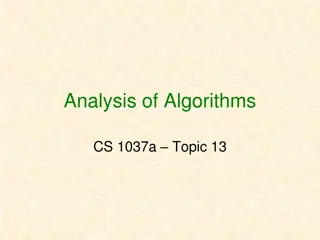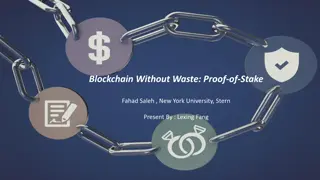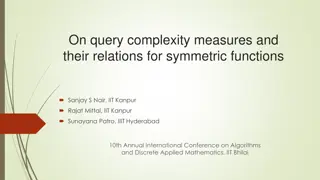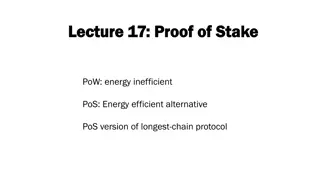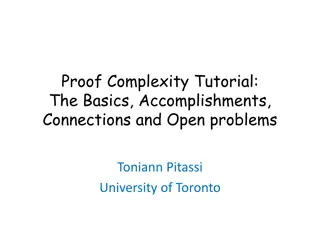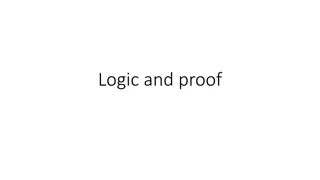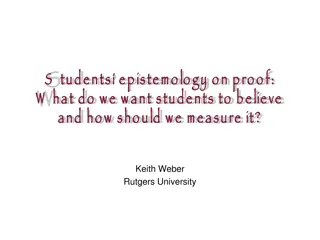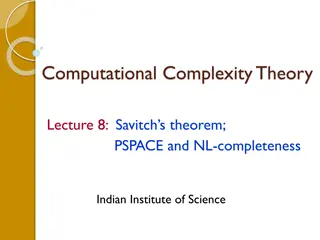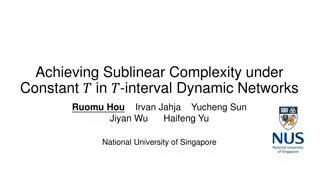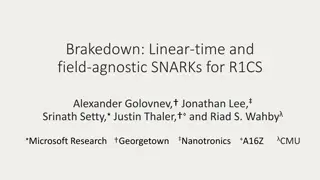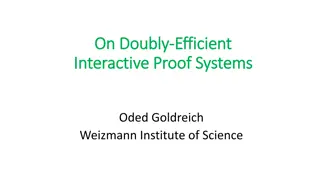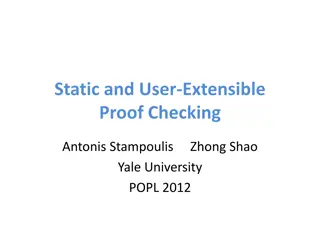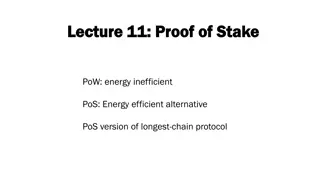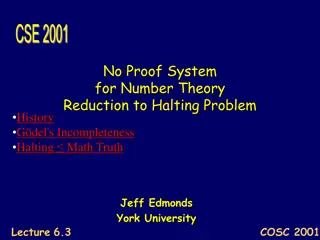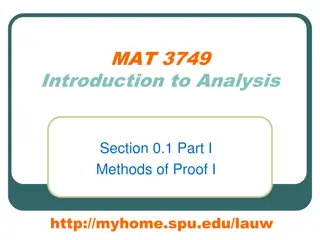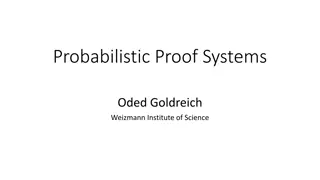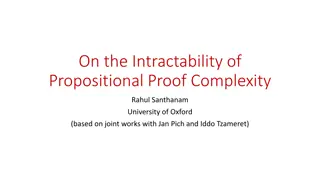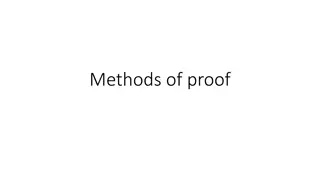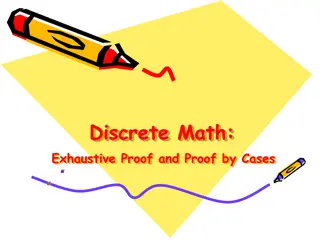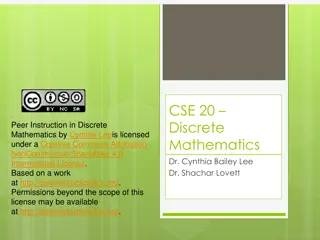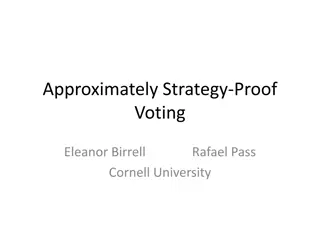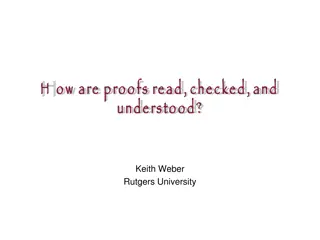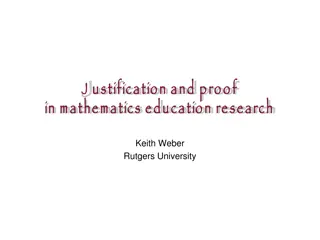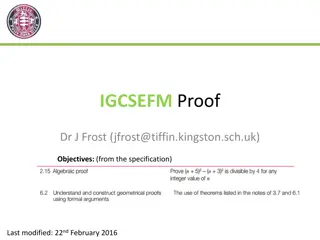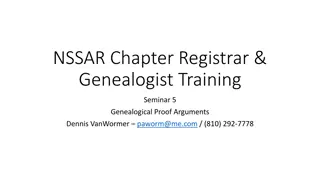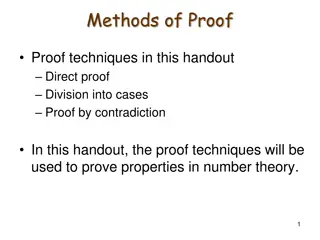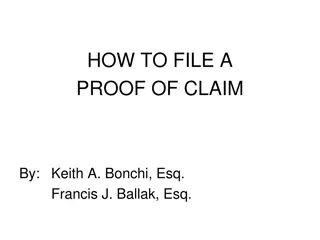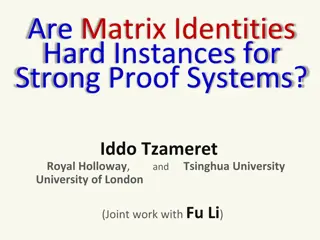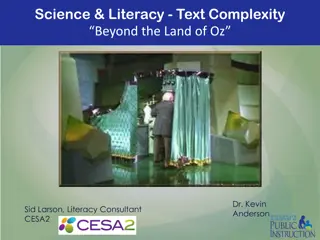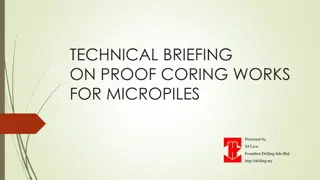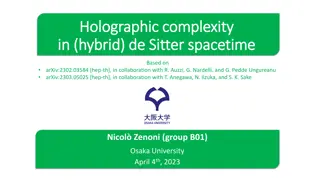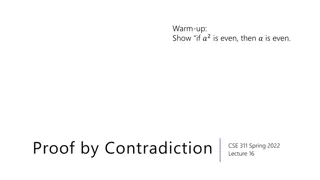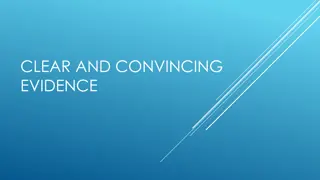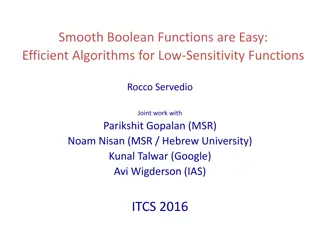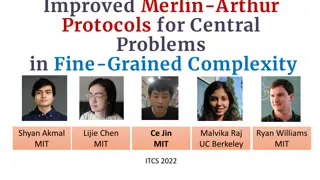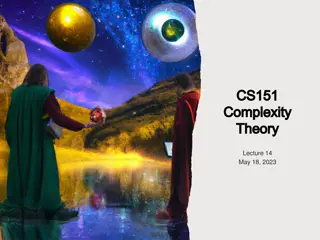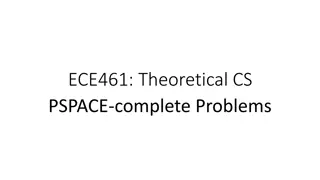Evolution of Mathematical Theories and Proof Systems
Development of mathematical theories such as model theory, proof theory, set theory, recursion theory, and computational complexity is discussed, starting from historical perspectives with Dedekind and Peano to Godel's theorems, recursion theory's golden age in the 1930s, and advancements in proof t
1 views • 29 slides
Understanding Burden of Proof in Removal Proceedings
This material provides an overview of challenging removability issues, burden of proof on removal charges, and key aspects related to Notice to Appear (NTA) and factual allegations in immigration cases. It discusses who holds the burden of proof in different scenarios, such as arriving aliens and th
1 views • 16 slides
Understanding Time Complexity in Algorithm Analysis
Explore the concept of time complexity in algorithm analysis, focusing on the efficiency of algorithms measured in terms of execution time and memory usage. Learn about different complexities such as constant time, linear, logarithmic, and exponential, as well as the importance of time complexity co
0 views • 73 slides
Blockchain Without Waste: Proof-of-Stake
A study on Proof-of-Stake (PoS) as an alternative to Proof-of-Work (PoW) in blockchain technology. PoS aims to create a sustainable permissionless blockchain by selecting a stakeholder to authorize transactions without the heavy energy consumption of PoW. The paper provides a formal economic model o
0 views • 16 slides
Quantum Query Complexity Measures for Symmetric Functions
Explore the relationships between query complexity measures, including quantum query complexity, adversary bounds, and spectral sensitivity, in the context of symmetric functions. Analysis includes sensitivity graphs, the quantum query model, and approximate counting methods. Results cover spectral
0 views • 19 slides
Proof of Stake: Energy-Efficient Alternative to Proof of Work
Proof of Stake (PoS) is presented as an energy-efficient replacement for Proof of Work (PoW) in blockchain protocols. PoS allows meaningful participation based on stakeholders' coin ownership, proportional to their stake. The process of finding nonces in PoW is replaced by owning coins in PoS to par
0 views • 16 slides
Exploring Proof Complexity: The Basics, Achievements, and Challenges
Delve into the intricacies of proof complexity, covering propositional, algebraic, and semi-algebraic proof systems, lower bound methods, and algorithmic implications. Discover fundamental connections to complexity theory and open problems in the field.
0 views • 76 slides
Mathematical Proof Methods and Divisibility Rules
In this lesson, we explore various methods of proof in mathematics, including direct proof, contrapositive, proof by contradiction, and proof by cases. We delve into basic definitions of even and odd numbers and learn about proving implications. Additionally, the concept of divisibility, prime numbe
0 views • 30 slides
Insights into Logic and Proof: A Historical Journey
Delve into the historical timeline of logic and proof, from ancient Egyptian mathematical activities to modern advancements in computational proof assistants. Discover the evolution of symbolic logic and the development of proof systems like natural deduction. Explore the significance of logical exp
0 views • 36 slides
Understanding Students' Epistemology on Proof in Mathematics Education
Explore the role of proof in mathematics education, focusing on how mathematicians and students approach and understand proofs. Delve into the challenges undergraduates face in justifying claims deductively and the historical shifts in investigating proof in education.
1 views • 72 slides
Overview of Computational Complexity Theory: Savitch's Theorem, PSPACE, and NL-Completeness
This lecture delves into Savitch's theorem, the complexity classes PSPACE and NL, and their completeness. It explores the relationship between time and space complexity, configuration graphs of Turing machines, and how non-deterministic space relates to deterministic time. The concept of configurati
0 views • 67 slides
Achieving Sublinear Complexity in Dynamic Networks
This research explores achieving sublinear complexity under constant ? in dynamic networks with ?-interval updates. It covers aspects like network settings, communication models, fundamental problems considered, existing results, and challenges in reducing complexity. The focus is on count time comp
0 views • 14 slides
Breakdown: Linear-time and Field-agnostic SNARKs for R1CS
Breakdown discusses linear-time and field-agnostic SNARKs for R1CS, focusing on achieving fast prover speeds and supporting circuits over arbitrary finite fields. SNARKs offer efficient proof systems with sub-linear proof sizes and verification costs. The work aims to eliminate the need for FFT-frie
0 views • 28 slides
Efficient Interactive Proof Systems Overview
This document discusses various aspects of efficient interactive proof systems, including doubly efficient IPs, simple doubly efficient IPs, and the Sum-Check Protocol. It explains concepts such as completeness, soundness, and strategies for verifiers and provers. The content covers examples like NP
0 views • 12 slides
Exploring Architecture and Challenges of Proof Assistants
Explore the architecture of proof assistants, discussing the use of tactics, formal proofs, and the difficulty in utilizing these tools. Discover the contribution of a new architecture for proof assistants, addressing extensibility and error checking, with a focus on soundness guarantees. Delve into
0 views • 41 slides
Understanding Proof of Stake in Blockchain Technology
This lecture delves into the concept of Proof of Stake (PoS) as an energy-efficient alternative to Proof of Work (PoW) in blockchain protocols. It explores how PoS allows meaningful participation based on the stake individuals hold, replacing the need for energy-intensive mining. The lecture discuss
0 views • 28 slides
Evolution of Proof Systems in Mathematics: From Euclid to Godel
Exploring the journey of proof systems in mathematics from Euclid's era to Godel's incompleteness theorem, highlighting the challenges and evolution in understanding truth, halting problems, and the impact on number theory. The concept of designing a proof system that proves everything and the impli
0 views • 30 slides
Introduction to Analysis Methods of Proof
This content introduces various methods of proof in analysis, including direct proof, counterexamples, and indirect proofs like contrapositive. It covers common notations, sets, symbols, implications, theorems, and examples with analyses. The goal is to understand how to prove or disprove theorems u
0 views • 22 slides
Understanding Probabilistic Proof Systems in Complexity Theory
Explore the world of probabilistic proof systems in complexity theory through the works of Oded Goldreich from the Weizmann Institute of Science. Dive into concepts like NP-proof systems, interactive proof systems, completeness, soundness, and efficient verification procedures with a focus on applic
0 views • 15 slides
Understanding Propositional Proof Complexity and Lower Bounds
Studies focus on the intractability of propositional proof complexity, exploring the power of proof systems to verify tautologies. Discussion on known lower bounds and challenges in proving hardness of certain tautologies.
0 views • 23 slides
Methods of Proof in Mathematics
Understanding methods of proof in mathematics involves providing convincing arguments to show the truth of propositions. This involves logical deduction, implications, and establishing new facts from known ones. Different techniques like direct proof and specific logical rules such as modus ponens a
0 views • 21 slides
Understanding Exhaustive Proofs and Proof by Cases in Discrete Math
Exhaustive proofs and proofs by cases are essential methods in discrete mathematics for proving theorems. Exhaustive proofs involve checking all possibilities, while proof by cases focuses on considering different scenarios separately. The methods are illustrated through examples like proving (n+1)^
0 views • 8 slides
Discrete Mathematics: Proof by Cases Example
Exploring a proof by cases example in discrete mathematics, focusing on a theorem stating that among any 6 people, there are either 3 who all know each other or 3 who don't know each other. The explanation breaks down the proof step by step, demonstrating case analysis and subcases to logically show
1 views • 29 slides
Strategy-Proof Voting: Approximations and Possibilities
Explore the concept of approximately strategy-proof voting through models and constructions, aiming to prevent manipulation while ensuring fair outcomes. Discuss the challenges and potential methods to circumvent manipulations based on Gibbard-Satterthwaite theorems. Delve into defining approximatio
1 views • 11 slides
Understanding and Checking Mathematical Proofs
Reading and understanding mathematical proofs involves careful analysis of logic and reasoning. Mathematicians and students use various strategies to ensure correctness, such as examining assumptions, following step-by-step logic, and verifying conclusions. This process is crucial for grasping the v
1 views • 79 slides
Perspectives on Justification and Proof in Mathematics Education Research
This presentation explores diverse perspectives on proof in mathematics education, highlighting the role of proof in K-12 classrooms and discussing students' challenges with proof. It delves into research perspectives on what constitutes a proof, the goals of mathematics educators, and the link betw
1 views • 74 slides
Mastering IGCSEFM Proof Techniques
Dive into the world of algebraic and geometric proofs with this comprehensive guide on IGCSEFM proof techniques by Dr. J. Frost. Explore various proof examples and test your understanding with challenging questions to enhance your skills in proving mathematical statements.
1 views • 19 slides
Genealogical Proof Arguments and SAR Standard of Proof
This detailed content covers the definitions and components of genealogical proof arguments, proof summaries, and the SAR standard of proof. It explains the importance of evidence quality, source citations, and analysis in establishing acceptable genealogical conclusions for SAR membership applicati
0 views • 22 slides
Understanding Proof Techniques in Number Theory
Explore methods of proof, such as direct proof and proof by contradiction, to establish properties in number theory. Learn about even and odd integers, the method of direct proof, writing proofs effectively, common mistakes to avoid, and types of mathematical statements like theorems, propositions,
0 views • 15 slides
Steps to File a Proof of Claim in Bankruptcy Proceedings
Learn how to file a proof of claim in bankruptcy cases under different chapters such as Chapter 7, 13, and 11. Understand the types of bankruptcy, timing for filing a proof of claim, and how to prepare the claim accurately. Essential information for legal professionals and individuals involved in ba
0 views • 26 slides
Exploring Matrix Identities in Strong Proof Systems
This study delves into the complexity of matrix identities as potential challenges for robust proof systems. Through new algebraic techniques, the research aims to propose and analyze non-commutative polynomial identities over matrices, shedding light on lower bounds and conjectures for strong arith
0 views • 57 slides
Understanding Text Complexity in Science and Literacy Education
Exploring the concept of text complexity beyond the familiar realm of Oz, this presentation delves into quantitative and qualitative measures, reader and task considerations, and steps to assess text complexity. Various resources and examples are provided to help educators gauge and improve the comp
0 views • 43 slides
Proof Coring Works for Micropiles: A Technical Briefing by SS Liew Foundtest Drilling Sdn Bhd
Proof coring is a common method to assess concrete/grout quality in cast-in-situ pile shafts or jet-grouted soil. This technical briefing by SS Liew Foundtest Drilling Sdn Bhd covers the methodology, equipment used, and technical issues related to proof coring for micropiles. The process involves dr
0 views • 8 slides
Holographic Complexity in Hybrid De Sitter Spacetime
The research delves into holographic complexity in a hybrid de Sitter spacetime, exploring the AdS/CFT correspondence, quantum information in the bulk, and computational complexity. It also examines the volume of the ERB, evolution of complexity in CFT, and probes cosmological horizons using hologra
0 views • 12 slides
Understanding Proof by Contradiction in Mathematics
Proof by contradiction is a powerful technique used in mathematics to establish the validity of a statement by assuming its negation leads to a contradiction. This method involves supposing the opposite of what needs to be proven and demonstrating that this assumption inevitably results in an incons
0 views • 21 slides
Understanding Burden of Proof and Standards of Evidence in Legal Proceedings
In legal proceedings, the burden of proof determines which party must prove their case to the trier of fact. The standard of proof refers to the level of certainty required to establish proof, with higher stakes demanding a higher standard. Decision-makers must apply clear and convincing evidence st
0 views • 13 slides
Understanding Complexity Measures of Boolean Functions
This work delves into the intricate world of complexity measures for Boolean functions, exploring concepts such as certificate complexity, decision tree depth, sensitivity, block sensitivity, PRAM complexity, and more. It sheds light on the relationships among different complexity measures and provi
0 views • 36 slides
Improved Merlin-Arthur Protocols for Fine-Grained Complexity Problems
The text discusses Merlin-Arthur proof systems and protocols for central problems in fine-grained complexity, particularly focusing on the time complexity, completeness, and soundness of these protocols. It also touches on recent interest in these protocols and presents new results in areas such as
0 views • 16 slides
Interactive Proofs in Complexity Theory
Delve into the realm of interactive proofs in complexity theory, exploring concepts such as completeness, soundness, and efficiency. Discover how interactive proof systems can be utilized in scenarios like graph isomorphism and their implications on the complexity classes NP and coNP. Uncover the in
0 views • 40 slides
Understanding PSPACE-Complete Problems in Complexity Theory
This content delves into complexity theory, exploring PSPACE-complete problems and their relevance within the realm of theoretical computer science. It covers concepts such as time complexity classes, P vs. NP dilemma, NP-complete languages, space complexity, PSPACE vs. NPSPACE, and PSPACE completen
1 views • 19 slides


